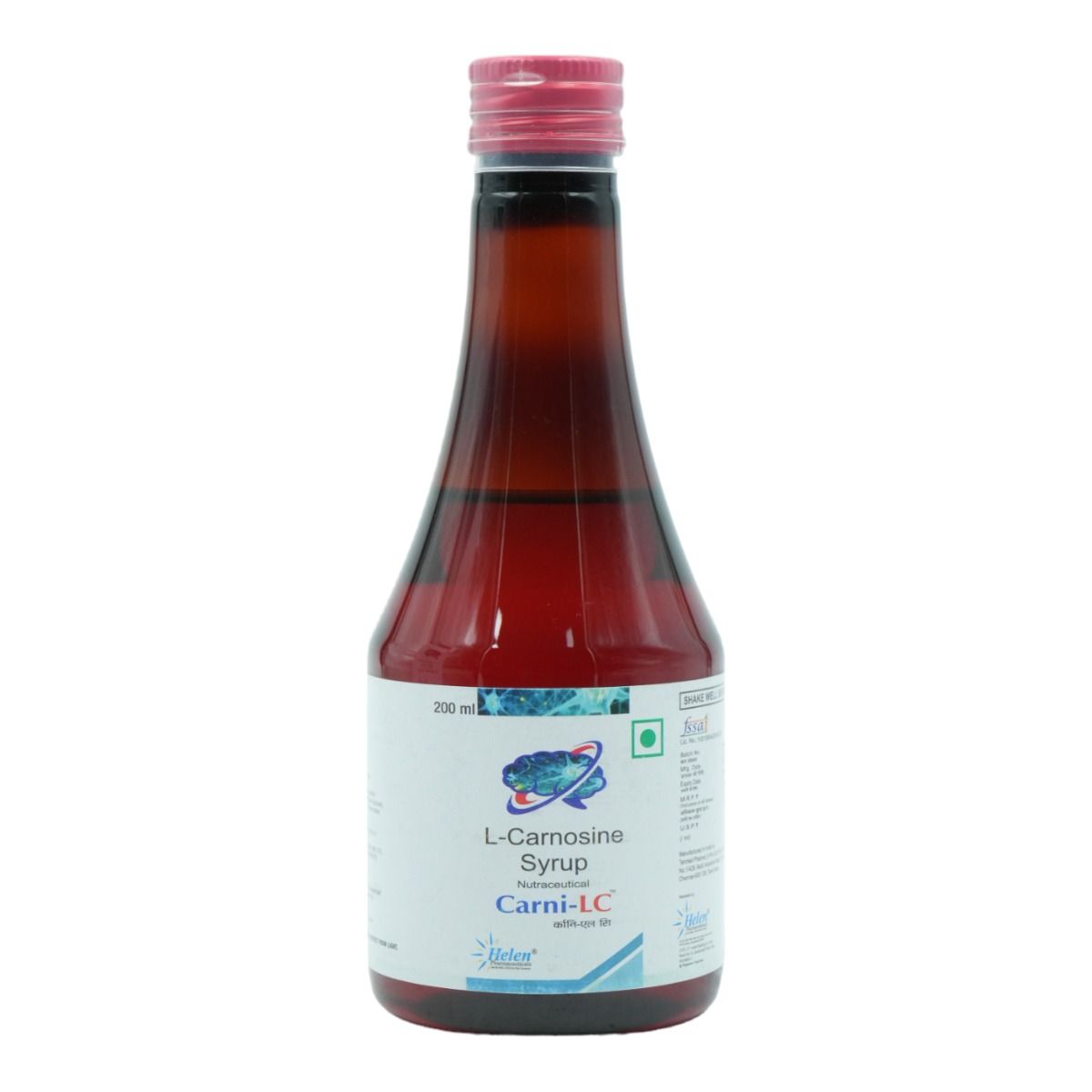L Carnosine
About L Carnosine
L Carnosine is used in the management of autism and learning disorders. L Carnosine may also be used to prevent/treat attention-deficit hyperactivity disorder (ADHD), ageing, eye disorders, complications of diabetes such as nerve damage, cancer, Alzheimer's disease, and liver and kidney problems. L Carnosine is necessary for normal body functions such as proper functioning and development of the heart, muscles, brain, kidneys, and other organs.
L Carnosine contains 'L-carnosine', a dipeptide molecule made up of two amino acids, namely, beta-alanine and histidine. L Carnosine prevents cognitive decline by inhibiting amyloid-beta and enhances nervous system function in individuals with autism. It helps reduce the build-up of amyloid-beta, a protein that forms the brain plaques associated with Alzheimer's disease. L Carnosine helps prevent kidney and nerve damage in people with diabetes by protecting against damage caused by protein glycation.
You are advised to take L Carnosine for as long as your doctor has recommended, depending on your medical condition. In some cases, you may experience certain common side effects, such as stomach upset, headache, nausea, and vomiting. Most of these side effects do not require medical attention and will resolve gradually over time. However, you are advised to talk to your doctor if you experience these side effects persistently.
Let your doctor know if you are taking any other medicines or herbal products before starting with L Carnosine. If you are known to be allergic to any of the components in L Carnosine, please inform your doctor. Consult your doctor before taking L Carnosine if you are pregnant or breastfeeding. L Carnosine should be given to children only if recommended by a doctor. It is unknown if alcohol interacts with L Carnosine, so please consult a doctor if you have any concerns.
Uses of L Carnosine
• Aids blood circulation: L Carnosine supports healthy blood circulation and optimal blood pressure.
• Maintains cholesterol levels: L Carnosine helps maintain healthy cholesterol levels.
• Supports bone health: L Carnosine strengthens bone structure and skeletal integrity.
• Manages blood sugar: L Carnosine helps in maintaining healthy blood sugar levels.
• Promotes physical endurance: L Carnosine improves physical activity and endurance.
• Improves cognitive function: L Carnosine enhances mental focus, cognitive function, and mood balance.
Medicinal Benefits
L Carnosine is used in the management of autism and learning disorders. L Carnosine may also be used to prevent/treat ageing, eye disorders, diabetic nerve damage, cancer, Alzheimer's disease, liver and kidney problems. L Carnosine contains 'L-carnosine', a dipeptide molecule made up of two amino acids, namely, beta-alanine and histidine. L Carnosine works by inhibiting the formation of carbonyl groups, thereby reducing the formation of abnormal proteins. In individuals with autism, L Carnosine helps improve behaviour, socialisation, communication, and vocabulary, and increases language comprehension. L Carnosine helps prevent kidney and nerve damage in people with diabetes by protecting against damage caused by protein glycation. L Carnosine is necessary for normal body functions such as proper functioning and development of the heart, muscles, brain, kidneys and other organs. L Carnosine prevents cognitive decline by inhibiting amyloid-beta and enhances nervous system function in children with autism. It helps reduce the build-up of amyloid-beta, a protein that forms the brain plaques associated with Alzheimer's disease.
Directions for Use
- Take L Carnosine with food to reduce gastrointestinal side effects or as advised by the doctor.
- Follow your doctor's instructions on the dosage and timing of this medication to ensure safety.
- Swallow the medicine as a whole with a glass of water.
- Do not crush, break, or chew it.
Storage
Side Effects of L Carnosine
- Stomach upset
- Headache
- Nausea
- Vomiting
Drug Warnings
Do not take L Carnosine if you are allergic to any of its components. Inform your doctor if you have mania, hyperactivity, kidney or liver problems. Consult a doctor if you are pregnant or breastfeeding. L Carnosine should be given to children only if recommended by the doctor. Keep your doctor informed about your health condition and the medicines you are taking to rule out any side effects or interactions.
Drug Interactions
Drug-Drug Interactions: No interactions found/established.
Drug-Food Interactions: No interactions found/established.
Drug-Disease Interactions: No interactions found/established.
Drug-Drug Interactions Checker List:
Safety Advice

Alcohol
consult your doctorIt is unknown if alcohol interacts with L Carnosine, so please consult a doctor.

Pregnancy
cautionPlease consult a doctor if you are pregnant. Your doctor will recommend only if the benefits outweigh the risks.

Breast Feeding
cautionPlease consult a doctor if you are breastfeeding. Your doctor will decide if L Carnosine can be taken by breastfeeding mothers or not.

Driving
consult your doctorIt is unknown whether L Carnosine affects your ability to drive. Drive or operate machinery only if you are alert.

Liver
consult your doctorLimited data are available regarding the usage of L Carnosine in patients with liver impairment. Please consult your doctor.

Kidney
consult your doctorLimited data is available regarding the usage of L Carnosine in patients with kidney impairment. Please consult your doctor.

Children
cautionL Carnosine should be given to children only if recommended by the doctor.
Habit Forming
Diet & Lifestyle Advise
- Maintain a healthy weight by following a balanced diet.
- Exercise regularly, as it helps in reducing cognitive decline and brain volume loss.
- Avoid smoking and alcohol consumption.
- Avoid stress by practising meditation or yoga.
- Include fruits and vegetables in your diet as they contain antioxidants.
- Eat nutritious food, as it helps stimulate cognitive function.
- Limit foods with high cholesterol and saturated fats.
- Reduce your intake of sugar, salt, and processed foods.
- Follow a healthy lifestyle, as it helps improve overall health and may protect the brain.
Patients Concern
Disease/Condition Glossary
Autism: Autism, also known as autism spectrum disorder, is a developmental disorder that impacts the nervous system and impairs the ability to communicate and interact. It affects the cognitive, social, emotional, and physical health of the individual. Symptoms include difficulty in communication, social interaction, and repetitive behaviour.
Alzheimer's disease: Alzheimer's disease is a neurological disorder that causes dementia (memory loss) and slowly destroys the ability to think, learn, communicate, and eventually the ability to handle daily activities. Symptoms of Alzheimer's disease include memory loss, trouble with familiar tasks, difficulties with problem-solving, trouble with writing or talking, disorientation, problems with reasoning or judgment, and mood and personality changes.
FAQs
L Carnosine is used for the treatment of Autism, Alzheimer's disease, and learning disorders.
L Carnosine prevents cognitive decline by inhibiting amyloid-beta and enhances nervous system function in children with autism/autistic spectrum disorder. L Carnosine helps in improving language, auditory processing, socialisation, fine motor planning, expressive language, and awareness of surroundings.
L Carnosine might help treat Alzheimer's disease by reducing the build-up of amyloid-beta, a protein that forms the brain plaques associated with Alzheimer's. However, you are advised to talk to your doctor if you have any concerns regarding this.
L Carnosine might help prevent ageing by interfering with certain chemicals which play a role in the ageing process. However, it is advisable to consult your doctor if you have any concerns.
L Carnosine might lower the blood pressure. Talk to your doctor before taking L Carnosine if you have low blood pressure or if you are taking hypertension medicines. Regular monitoring of blood pressure while taking L Carnosine is advised.
To treat your condition effectively, continue taking L Carnosine for as long as your doctor has advised. Do not hesitate to consult your doctor if you experience any difficulties while taking L Carnosine.
The side effects of L Carnosine are generally mild and rare. Some possible side effects include stomach upset, nausea, diarrhoea, and vomiting. These side effects may occur in some cases, but not all individuals will experience them. Please consult your doctor if any of these side effects persist or worsen.
L Carnosine contains L-Carnosine as an active ingredient, which is a naturally occurring dipeptide composed of the amino acids beta-alanine and histidine.
Yes, L Carnosine is beneficial for brain health, as it supports mental acuity, improves cognitive function, and helps reduce anxiety. Additionally, it may aid in memory retention, alleviate mental exhaustion, and enhance focus and concentration. However, it is essential to consult with a doctor before taking L Carnosine.
The safety of using L Carnosine in pregnant women is not well-established. It is always best to consult with a healthcare provider before taking L Carnosine during pregnancy to ensure the safety of both the mother and the baby. Your doctor will recommend only if the benefits outweigh the risks.






